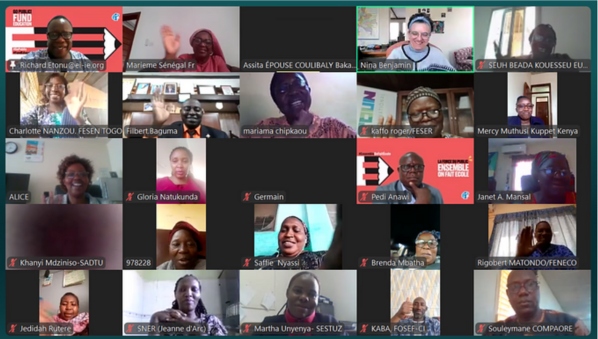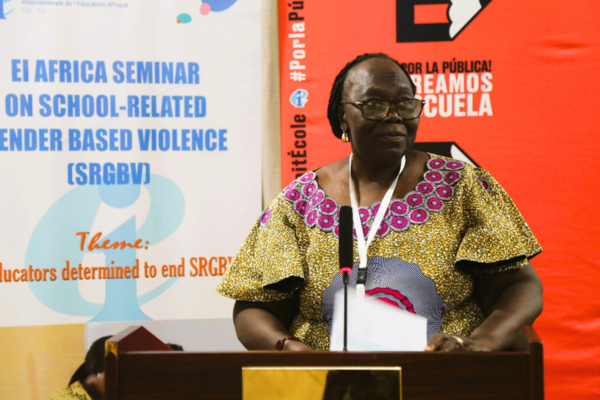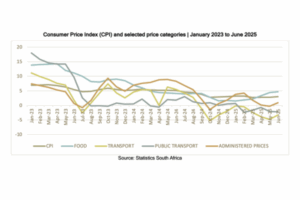Anais Dayamba, Regional Coordinator for Education International (EI), discusses the relaunch of the campaign against school-related gender-based violence (SRGBV) following a webinar facilitated by LRS in 2024. The interview focuses on the renewed efforts by teacher unions and lessons from their campaign against SRGBV in schools.
What led to the relaunch of Education International Africa's SRGBV campaign?
Our schools are still not safe. Learners and educators are experiencing gender-based violence both in and around educational settings. This is why phase 3 of the SRGBV campaign, launched in October, focuses on the theme, Educators Determined to End SRGBV.
EI represents 33 million educators through 400 organisations in 180 countries. Our mandate is to defend education as a human right and ensure that schools are inclusive and safe for all. Yet, reports like the Global Education Monitoring studies show that violence is still a daily reality in many school settings.
Phase 3 of the SRGBV campaign continues the efforts of EI Africa, following two coordinated continental campaigns: one from 2016 to 2019 and another during COVID-19 from 2021 to 2022, supported by UNGEI, Gender at Work, and LRS.
Our webinar in June 2024 was a lead-up to the launch of the third phase of the continental SRGBV campaign. It brought together teacher unions who had kept the campaign alive in their own countries, even though coordinated efforts at the continental level had paused for some time. Unions shared their experiences, lessons, and strategies, laying the groundwork for a renewed campaign.
What ideas and inspirations from the webinar are helping to drive the SRGBV campaign forward?
The webinar aimed to inspire unions to continue their current efforts. We created a safe space for EI member organisations to reconnect. We had 215 participants from unions, partner organisations, and education stakeholders across Africa. It created a safe space for people to share what they are seeing, what is working, and how we can improve now and in the future.
We learned that we have become more aware of the prevalence and impact of SRGV. We renewed our commitment and energy to take sustained action against SRGBV. We developed new strategies and approaches to tackle the issue. Unions new to the campaign shared their SRGBV strategies, learned from others, and created activity plans to address SRGBV in their countries.
Thank you to LRS for your support in meeting design, facilitation, and technical assistance.
Basil Manuel, Executive Director of the National Professional Teachers’ Organisation of South Africa (NAPTOSA), advocated for integrating SRGBV into unions’ operational manuals, recognising it as a critical issue that must be addressed at the institutional level.
Filbert Baguma, General Secretary of the Uganda National Teachers' Union (UNATU), said the severe impact of SRGBV undermines the ability of learners to fully benefit from their education.
Rebecca Ocran Abaidoo, West Africa Women in Education Network (WAWEN) Coordinator, said that unions in Ghana collaborate with partners and use media to amplify their campaigns.
Marie Antoinette Corr, General Secretary of the Gambia Teachers' Union (GTU), said SRGBV is a dedicated component of every programme within their union.
Agnès Béatrice Bikoko, Africa Women in Education Network (AWEN) President, said the union designed professional conduct guidelines for all educators to ensure a better understanding of SRGBV and effective ways to eradicate it within education.

What specific strategies did the new unions in the SRGBV campaign share?
Unions in French-speaking countries shared effective strategies for addressing SRGBV. They discussed empowering students and collaborating with civil society organisations to advocate for legislation against SRGBV and to raise community awareness.
The unions are reviewing school manuals to ensure they include gender-sensitive content and address SRGBV topics. Additionally, SRGBV modules are part of the teacher training curriculum.
Unions are developing and implementing teachers’ codes of conduct and updating their constitutions to address GBV effectively. Other strategies include providing legal support for educators, offering hygiene education for girls, and engaging parents and school leaders.
What lessons can you share with an organisation planning a similar campaign?
We can share rich lessons and experiences with those working to address GBVH to apply in their contexts, including:
- Awareness campaigns are vital in raising awareness about SRGBV and promoting a safe and inclusive school environment.
- Secure commitment from union leadership and mobilise union members as part of the actions to prevent and respond to SRGBV.
- Lobby governments to implement policies and laws against SRGBV.
- Build alliances and networks in diverse sectors to access resources, expertise and skills needed to strengthen response initiatives.
- Train teachers in SRGBV prevention and response to sustain the campaign actions.
- Strengthen the union’s capabilities, including research and policy and guidelines development.
“Education is a fundamental human right and a public good, as affirmed by the Universal Declaration of Human Rights and the African Union’s Agenda 2063. Yet, our schools are not always safe. I urge unions to push for the ratification and implementation of ILO Convention 190 on violence and harassment in the world of work. Every learner and teacher deserves a safe environment free from fear.”
Dr Dennis Sinyolo, Director of Education International Africa, at the launch of Educators Determined to End SRGBV initiative in Ghana in October.







